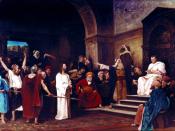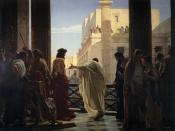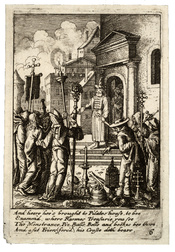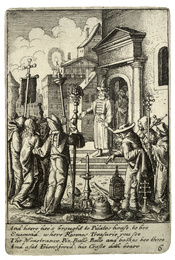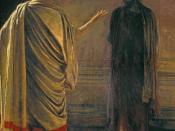The story of Jesus Christ is one of the most well-known in the world. Many authors from around the globe use or allude to his incredible story. It is told and retold numerous times, but hardly ever is that miraculous story retold in a realistic, dramatic, breathtaking way.
Unfortunately, a listener of the Gospel could fall asleep listening to such an account as Matthew, Mark, and Luke offer. Sometimes, however, an author appears who can retell the Christ story with a gut-wrenching, heart-pounding story line. One famous American author successfully did so with a celebrated work. The novella Billy Budd, Sailor by Herman Melville parallels the crucifixion of Jesus Christ in both characters and events. *The characters of Billy, Claggart, and Vere parallel Jesus, the Jewish people, and Pontius Pilate, *and the way in which Billy is prosecuted and dies parallels the way of Christ's end.
The characters of Billy, Claggart, and Vere are equal to the characters of Jesus, the Jewish people, and Pontius Pilate.
Billy is a truly good character in this story. His character represents innocence, righteousness, and a well-meaning attitude. Billy is characterized as the "Handsome Sailor," the epitome of everything a man should be. Jesus Christ, too, could be called a "Handsome Sailor." Jesus is kind, beautiful, and the quintessence of everything a moral, humble human should be. In the story, Billy and Jesus are both persecuted in their innocence. Their lives are both left in the hands of someone else, who must decide between the circumstances.
They are also both accused of a terrible crime of which they are not guilty. In Billy Budd, Sailor, that accuser is John Claggart; in the Gospel, the accusers are the Jewish people who had turned against Jesus. Claggart is characterized by this quote, "Now something such an one was Claggart, in whom was the mania of an evil nature, not engendered by vicious training of corrupting books or licentious living, but born with him and innate, in short 'a depravity according to nature.'" This quote explains that Claggart, with his pure evil, did not have this evil impressed upon him; instead, it has been with him since the time he was born. The Jewish people, who are made the jury by Pontius Pilate, also are evil like Claggart. As a whole they decide to convict Jesus and set Barabus free. In both cases, the accusers resolve to punish and persecute human good and set evil free. Lastly, Captain Vere compares directly to Pontius Pilate. Captain Vere must decide between setting Billy, a true and good person, free or putting him to death; Pontius Pilate must determine whether to set Jesus, a good and true person, free or put him to death. Both men find themselves having to face a true human dilemma: the choice between good and evil, the choice between Billy and Claggart, the choice between Jesus and the Jewish people. Also, both men have a dangerous situation on their hands. If Captain Vere lets Billy free, he has a possibility of an outbreak of mutiny on his ship. I f Pontius Pilate finds for Jesus, the Jewish crowd might have easily turned into an uproarious, angry mob.
Not only are the characters parallel, but the events that lead up to Billy's death, and the death itself, parallel Christ's prosecution and death. At the start of the troubles, Billy is accused of something he isn't guilty of by an evil, malicious, and vengeful Claggart; Jesus is accused of something he isn't guilty of by the jealous, frightened Pharisees and Jewish people. When the case is brought to the courts, Captain Vere is faced with a vital decision: should Billy be set free on the basis of conscience, or should he be put to death according to the naval law? Pontius Pilate is faced with the exact same decision. Vere determines that the law should preside, and though his conscience aches, he must have Billy be hanged. Pontius Pilate decides that though his morals want to set Jesus free, he must follow what the Jewish people want; he sentences Jesus to die on the cross. In these events preceding the death alone, there are many similarities between the two stories. But when the actual death comes, there is a great parallelism. On the morning of the execution, the soldiers are assembled together to watch the punishment.
Hundreds of people gathered at Golgatha to watch the crucifixion of Jesus. At the moment Billy is hanged, there is an allusion made. "At the same moment it chanced that the vapory fleece hanging low in the East was shot through with a soft glory as of the fleece of the Lamb of God seen in mystical vision, and simultaneously therewith, watched by wedged mass of upturned faces." This shows Billy's connection to God and the heavens, as was apparent with Jesus when the end approached. Also, a few seconds after Billy's death, a rumble of disconcertment is heard among the sailors. This is parallel to the rumble of thunder heard after Christ died on the cross.
Furthermore, Billy is described as such after his death, "Billy ascended; and, ascending, took the full rose of the dawn." Billy ascending after death and Christ ascending after death are one and the same. Lastly, this final allusion is made, "To them a chip of [the spar from which Billy was hanged] was as a piece of the Cross." This is the last connection between Jesus and Billy.
This parallelism retells the Christ story in a dramatic way. One can more deeply realize the intensity and drama of the events, and the depths and emotions of each character. These events and characters in Billy Budd, Sailor portray the story's theme throughout the novella; the dramatic effect of a choice man makes between good and evil. The reader can see the difficult choice Captain Vere and Pontius Pilate go through, and then, more importantly, can begin to see it in his or her own life. Whether reading the story of Jesus Christ or Billy Budd, Sailor, a reader must determine for himself whether siding with evil can ever be a justifiable act, or if the good and righteous should always pull through. Pontius Pilate's and Captain Vere's actions are left to be judged by the reader; it is up to him or her to decide whether there is ever a right or wrong, good or evil, either in scripture, this novella or in life itself.

